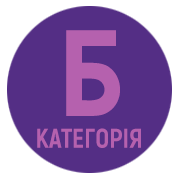DEVELOPMENT OF PERSONAL AND AESTHETIC QUALITIES IN STUDENTS WITH DISORDERS OF INTELLIGENCE DEVELOPMENT IN SPECIAL EDUCATION INSTITUTIONS AND EDUCATIONAL INSTITUTIONS WITH INCLUSIVE EDUCATION
DOI:
https://doi.org/10.32782/inclusion/2024.4.2Keywords:
system of aesthetic education, art, students with intelligence disorders, special educational institution, educational institution with inclusive educationAbstract
The article deals with the problem of formation and development of personal and aesthetic qualities in students with intelligence disorders in special educational institutions and educational institutions with inclusive education. Through the scientific and theoretical analysis of literary sources, the role of aesthetic education as an integral component of the correctional and educational process of an educational institution has been proven. The essence of the concepts "aesthetic education", "system of aesthetic education" has been analyzed, the educational potential of art as the main means of aesthetic education is revealed. An analysis of current international trends in the aesthetic education of individuals with special educational needs has been conducted. According to the results of the conducted experiment, it is established that the corrective reserves of aesthetic education consist in providing such pedagogical conditions, when the process of personal and aesthetic development of schoolchildren is aimed at enriching the sensory sphere, correction and special orientation of intellectual activity, raising the awareness of assimilation of artistic and aesthetic information, motivational and evaluative judgments, activation of cognitive processes, intellectualization of practical and aesthetic activity, increase of its independence and manifestation of elements of creativity. At the same time, the interaction of needs-oriented and motivational, cognitive, emotional-sensual and activity spheres of personal-aesthetic development is considered as a condition of unity and integrity of corrective-compensatory and aesthetic influences on this process. The primary functions of aesthetic education have been identified: cognitive, corrective-developmental, and educational. The general didactic and special principles of aesthetic education, which guide the teacher's activities in choosing the forms, methods, and techniques of corrective and educational work, have been substantiated. The three stages of pedagogical work are characterized, each of which, being a logical continuation of the previous one, corresponds to the implementation of the corrective functions of aesthetic education, and develops and improves the students' basic artistic and aesthetic knowledge, concepts, and practical artistic skills. Further avenues of research are planned in order to improve the system of aesthetic education of students with intelligence disorders in special educational institutions and educational institutions with inclusive education.
References
Дмитрієва І. Сучасні педагогічні системи в спеціальній та інклюзивній освіті: навчально-методичний посібник. Слов’янськ: Вид-во Б. І. Маторіна, 2021 р. 74 с.
Дмитрієва І. Корекційні можливості естетичного виховання учнів з порушеннями розумового розвитку. International Academy Journal WEB of SCHOLAR: Multidisciplinary Scientific Journal. 4 (22), Vol. 4, April 2018. 23-27.
Картава Ю. Діти з особливими потребами у загальноосвітньому закладі: метод. рекомендації. Суми: СумДПУ імені АС Макаренка. 2012. 68 с.
Миронова С., Чопік О. Корекційна психопедагогіка. Олігофренопедагогіка: підручник. 2-е видання, перероблене та доповнене. Кам’янець-Подільський: Кам’янець-Подільський національний університет імені Івана Огієнка, 2023. 332 с.
Синьов В. Корекційна психопедагогіка. Олігофренопедагогіка. Підручник. Ч. 1. Київ: НПУ імені М.П. Драгоманова, 2007. 238 с.







